Is Ralph good or evil? In William Golding’s Lord of the Flies, Ralph is one of the main characters who can be interpreted as representing “good” within the story. He is a symbol of civilization and leadership, constantly working towards creating a system of order and rules in order to protect and ensure the survival of himself and his fellow survivors. But does this make him inherently good?
Is Ralph good or evil? (Answered)
Ralph’s actions throughout the novel can be seen as morally justifiable. He initially attempts to maintain peace and order among the boys by establishing a system of rules, such as holding regular meetings and giving each boy a specific task to perform. He also tries to keep morale up by encouraging everyone to work together towards achieving their common goal – being rescued.
Furthermore, he shows empathy towards others, especially Piggy. When Piggy’s glasses are stolen by Jack’s group, Ralph immediately tries to retrieve them for him because he knows they are important for starting a fire that could potentially signal for rescue.
However, it is important to note that Ralph is not without flaws. He often gives in to his impulses, such as when he participates in hunting with Jack’s group despite knowing that it will lead to violence and chaos. Additionally, he struggles with leadership at times – becoming frustrated when others do not follow his orders or when he feels that his authority has been challenged.
Despite these shortcomings, it can be argued that Ralph’s actions ultimately stem from a desire for the greater good – ensuring safety and survival for all on the island. His willingness to listen to other opinions during meetings demonstrates his respect for democracy and open communication.
In contrast, Jack represents savagery within human behavior – leading his group through intimidation and coercion rather than cooperation. While he may initially seem charismatic and capable of inspiring loyalty from others, he ultimately becomes consumed by power and control.
Therefore, looking at Ralph in comparison with Jack makes him appear more “good” than “evil”. However, it is important to remember that these labels are not necessarily accurate nor sufficient in describing complex human behavior.
Who is good and bad in Lord of the Flies?
In Lord of the Flies, Ralph represents the good as he upholds democratic values and seeks to maintain order and rescue on the island. He is fair-minded, responsible, and shows concern for the well-being of others. On the other hand, Jack symbolizes the bad as he becomes consumed by power and authoritarianism. He resorts to violence, manipulation, and forms a tribe that embraces savagery rather than civilization.
How does Ralph represent good in Lord of the Flies?
Ralph represents good in Lord of the Flies through his commitment to living by rules, advocating for peace, and following moral commands. He consistently prioritizes the well-being of the group over personal desires or power struggles, demonstrating his selflessness and sense of responsibility. His unwavering dedication to maintaining order and fairness on the island highlights his embodiment of goodness amidst the chaos and savagery that unfolds throughout the novel.
Was Ralph a bad leader?
Yes, Ralph can be considered a bad leader due to his flawed leadership. His indecision and inability to think clearly in crucial moments hindered his effectiveness as a leader. These shortcomings prevented him from making timely and decisive decisions that could have potentially saved lives and maintained order on the island.
What is important to Ralph in Lord of the Flies?
What is important to Ralph in Lord of the Flies is his instinct for civilization and democracy. He believes in maintaining order, establishing rules, and working together as a group to ensure the well-being and survival of all. Despite the challenges on the island, Ralph remains committed to these principles and strives to create a sense of normalcy amidst the chaos.
Why did Jack betray Ralph?
Jack betrays Ralph because he believes that Ralph is not a fit leader. Throughout the novel, Jack grows increasingly resentful of Ralph’s authority and popularity among the boys. He sees himself as a more capable and powerful leader, and his desire for control drives him to form his own tribe. Jack’s betrayal of Ralph is fueled by his ambition to seize power and establish himself as the dominant figure on the island.
Conclusion
In conclusion, while Ralph may exhibit some flaws throughout Lord of the Flies, overall his actions demonstrate an innate desire for orderliness and morality on the island. As such, one could argue that he embodies qualities traditionally associated with “good”, especially when compared with Jack’s savage behavior.
